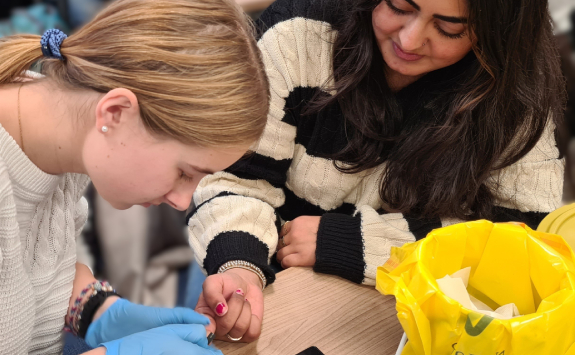Pre-Health for Study Abroad
Designed for students looking to gain clinical experience prior to a career in health and allied health practices.
I became much more comfortable managing real patients and addressing their health-related questions... it provided invaluable hands-on learning.
In addition to this experiential, overseas learning experience, participating students will also receive:
- bespoke Newcastle University surgical scrubs
- membership to Pharmsoc - a student-led society that offers support, social events and professional networking opportunities
- invitation to the formal Winter Ball
- a range of services and benefits offered to all Study Abroad students
Newcastle University’s Young@Heart Clinic
This innovative student-led cardiovascular health clinic is based in the famous Grainger Market. It is located in the heart of Newcastle’s city centre 10 minutes’ walk from the university campus. Home to hundreds of local traders and small businesses, this market has proven a superb location for the Young@Heart clinic.
At the clinic, students offer walk-in patients a basic health screening for cardiovascular disease. The screening mimics the standard NHS assessment commonly carried out by General Practitioners. In the UK, it is estimated that 4 million people under the age of 65 have undiagnosed hypertension. The expansion of screening is a critical step to addressing this problem. Students administer tests for blood pressure, blood glucose and blood cholesterol. They will also measure and weigh patients to calculate Body Mass Index. Following the tests, students will have a discussion with the patient about cardiac health and make recommendations. All interactions are supervised by expert clinicians from the university’s School of Pharmacy.
At this busy health clinic, Study Abroad students can expect to meet up to 20 patients over the course of a day. Students will develop the skills and experience to start building a professional identity. They will also contribute to the healthcare provisions in a frequently underserved local community and help tackle the challenges associated with cardiovascular health.
Modules
The Core Module – PHA2200: Clinical Skills for Pre-Health
The programme’s core module is structured in two parts. During the first part of the module, students undertake clinical and communication skills training within the School of Pharmacy.
During the first part of the semester, students will learn how to:
- administer test for blood pressure
- administer test for blood glucose
- administer test for blood cholesterol
- weigh and measure patients
- calculate Body Mass Index
- interpret and deliver screening results
- navigate data protection and privacy
- assess risk
- handle and deliver sensitive information
- understand and uphold patient consent policy
- provide relevant healthy lifestyle advice to patients
- signpost patients to local services and resources to enhance health and wellbeing
The second part of the module allows students to practice their skills in a supervised clinical setting at Newcastle University’s Young@Heart clinic. They'll work with local patients seeking information and reassurance on their cardiovascular health. Over a period of six working days throughout term, students will meet with between 50 and 100 patients and screen them for cardiovascular disease.
Students are assessed based on their portfolio of clinical practice - just as is done in the medical field. This is a series of professional reflections based on their work-based learning at the clinic. This mode of assessment will improve the student's confidence and provide feedback in a responsive manner to support their learning.
Additional and elective modules
In addition to the compulsory core module, students will register for two or three additional modules of their choosing.
From the Faculty of Medical Sciences, options include:
- Biochemistry
- Genetics
- The Molecular Basis of Cancer
- Cell Biology and Disease
- Genetic Variation in Common Disease
- Lifestyle and Disease
- Physical Activity, Nutrition and Health
- Sports and Exercise Medicine
- Applied Biochemistry
Students may take modules from other subject areas if the timetable facilitates this.
Some students will find they can transfer credits earned on this programme back to their university at home to count towards their degree award. Other students may simply value the experiential aspect of the programme and it will allow them to add a unique component to their resume or postgraduate study applications.
Carrying out the clinical skills and practicing patient communication made me more confident in my future career plans.

